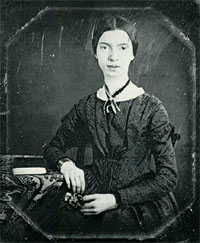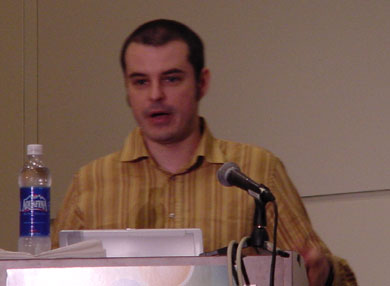
Emily Dickinson: An unlikely source for gaming inspiration...
Stepping up to the challenge, at times reluctantly, were three industry heavyweights. Peter Molyneux, famous for his God-games and bold game concepts (Black & White, Fable), stepped into the ring for the first time. The 'young upstart' this year was Clint Hocking, the major creative force behind Splinter Cell. And the returning champion -- creator of last year's hysterical winner, "Collateral Romance" -- was none other than Will Wright. You might also know him as the guy who created Sim City and The Sims.
I'll admit, this year's entries weren't quite as solid as last year's love stories, but that really isn't the point of the exercise. The whole idea, as Zimmerman explained, is to "look at games in a raw way," to "get a sense of the process that game designers go through" when solving tricky game issues. In the process of figuring out a solution to a crazy problem, everyone on stage -- and in the audience! -- would hopefully open up some new mental doors and see gaming in a new light.
Each contestant only had ten minutes to explain his idea to the crowd. Hocking kicked it off...

Clint Hocking tackles the problem.
Clint Hocking: Inspired
Hocking dived right into the challenge, but quickly found that when "the sky is the limit" it's hard to pin down an actual working game design. At first he thought that the biggest challenge for an Emily Dickinson game is a marketing problem. He briefly ran over a couple of ways that people would be able to relate to the game:
First he joked about "Emily Dickinson's POETRY SLAM," where famous wordsmiths from eras past would duel to the death Mortal-Kombat style. Could anyone withstand the passionate fury of Robert "Iceman" Frost, who's special move was to bore his opponent to death? Ultimately he decided that wasn't the way to go (in part because Emily Dickinson just doesn't lend herself to a really good finishing move.) Hocking also joked about creating "American McGee's Emily," where the reclusive poet might come back from the dead to save her childhood home in a dark adventure. Of course, since he wasn't American McGee, he set the idea aside.


